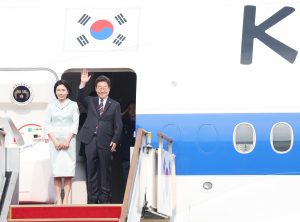On August 23, South Korean President Lee Jae-myung visited Japan for a summit meeting with Prime Minister Ishiba Shigeru, which produced the first joint press release by leaders of the two neighbors in 17 years. The next day, Lee went to the United States to meet with U.S. President Donald Trump, before returning to South Korea on August 28.
In visiting Japan for a summit meeting before traveling to the United States, Lee showed observers both inside and outside Seoul the degree to which he is prioritizing South Korea’s relationship with Japan. Moreover, on the question of historical issues, including the intergovernmental agreement on the comfort women issue and the third-party reimbursements for the former civilian workers from the Korean Peninsula, Lee has stated that he will uphold agreements between Japan and South Korea entered into by the past conservative administrations of Park Geun-hye and Yoon Suk-yeol. In doing so, he has assuaged Japanese concerns about the progressive administration of Lee Jae-myung being “anti-Japanese.”
Recent relations between Japan and South Korea deteriorated most sharply between 2018 and 2020, when Abe Shinzo was in power in Japan and Moon Jae-in was president of South Korea. A contributing factor was the failure of the first Trump administration to play a mediating role; Washington at the time was focused on American interests and not on encouraging cooperation among its Asian allies. In fact, the main axes have always been the Japan-U.S. and the South Korea-U.S. alliances, with Japan-South Korea relations only secondary. Under this system, the United States would mediate between Japan and South Korea, in their squabbles over historical issues.
In August 2023, Japan, the United States, and South Korea established the Camp David Principles and the Spirit of Camp David. This partly owed to the inauguration of the conservative Yoon administration, which actively sought Japan-South Korea-U.S. cooperation, and prompted expectations that trilateral security cooperation would become more institutionalized. Yet Yoon was ousted as president after his illegal declaration of martial law, and with the incoming government of Lee Jae-myung the outlook for trilateral relations was once again unclear. However, Lee has quickly dispelled concerns and emphasized continuity in trilateral relations.
All of which meant that Trump’s remarks at the South Korea-U.S. summit that he was concerned about Japan-South Korea relations because of historical issues were unexpected. Lee replied that his visit to Japan in advance of the summit with Trump “sorted out the issues,” so the U.S. president need not worry. The exchange suggests that not only will Japan-South Korea relations not assume their conventional structure with Washington as mediator, but that at least for the duration of this second Trump administration, on some issues we may even see Japan and South Korea cooperating in response to the United States.
For instance, coordination and cooperation between Japan and South Korea on shared issues will inevitably become more likely in the context of negotiations with the United States. Examples include responding to Trump’s tariff policy, modernizing the alliance to give it the strategic flexibility to deal with China and encompass more defense spending, and holding discussions on ways to meet the costs of American military bases.
As for the growing tensions between the United States and China, Lee said in a Q&A after his speech at the Center for Strategic and International Studies that South Korea has no choice but to choose a China policy within the framework of U.S. economic security, because the previous “Ahn Mi-kyung-joong” route – which means cooperating with the U.S. on security and with China in the economic realm – is no longer viable. This signaled a departure from the Moon Jae-in administration’s “strategic ambiguity,” which was meant to avoid a situation where South Korea had to choose between the United States and China. Amid rising China-U.S. tensions, Japan and South Korea have no choice but to prioritize cooperation with the United States, while trying not to become too embroiled in the conflict.
That’s not all. At their summit, Japan and South Korea agreed to cooperate on North Korea. In his own meeting with Lee, meanwhile, Trump showed considerable interest in a summit with North Korea, interest that was welcomed by Lee, who said, “If you, Mr. President, become the peacemaker, then I will assist you by being a pacemaker.”
Given how reliant North Korea remains on the China-North Korea-Russia framework and its staunch opposition to denuclearization talks, it is unclear whether relations can improve to the extent expected by Trump. Still, Lee has proposed a “three-step denuclearization plan” called “freeze, reduction, complete denuclearization” for the North Korean nuclear issue, which is a more realistic policy than before. The hope is that improvements in Washington’s relations with Pyongyang will lead to a breakthrough in inter-Korean relations.
Observers might wonder how Japan will respond to this, as Tokyo maintains a hardline stance against North Korea over the abduction issue and given that Ishiba’s resignation this week means a change of government in Japan.
Japan-South Korea relations can only become more crucial for both countries, as the neighbors must at times coordinate and cooperate on issues such as managing their alliances with the United States, responding to China-U.S. tensions, and coordinating North Korea policy. Moreover, coordination and cooperation between Japan and South Korea can serve as a public good, not only for the two countries but also for the region as a whole.
The bilateral relationship is an important one, and managing it effectively requires building a dense relationship equipped with strong problem-solving capabilities, and establishing an understanding of the importance of Japan-South Korean relations that can survive changes in government. This most recent summit signals that both governments have reaffirmed their intentions and strategies. Now they must move forward with negotiations to issue a new joint declaration that will build on the Japan-South Korea Joint Declaration of 1998 to accommodate issues such as China-U.S. tensions and the North Korean nuclear issue and the new strategic environment that has consequently emerged.

































